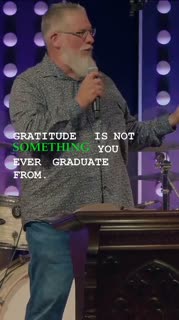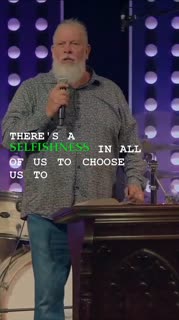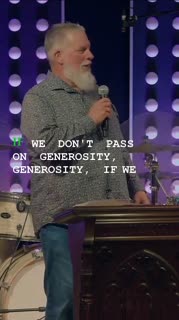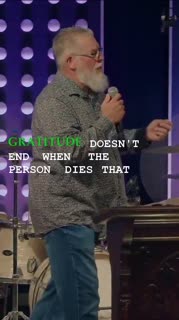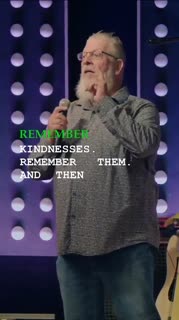Gratitude: A Journey of Remembering Kindness
Devotional
Sermon Summary
Bible Study Guide
Sermon Clips
1) "Gratitude is not something you ever graduate from. It's not something you'll ever arrive at. All of us can do better. Say it with me, I can do better. I can do better. If you don't believe that, then you're not a grateful person. If you're grateful, you know you could do better. And so don't get weary with me in this series because we're just getting started." [00:35] (24 seconds)
2) "There's a selfishness in all of us to choose us to kind of disregard. This is a next generation. Next generation. They've got nothing to feel like they owe to King Saul. But they were trained to shape their hearts to be grateful for kindness that people show you. So they rally together. This is such a great story. They rally together in verse 11, verse 12. They travel all night. They take down, in a sneak attack, they take down the bodies of Saul and his sons from the water. And they went to the wall of Beth -sham and went to Jabesh. And it doesn't say, but I'm assuming they went and got his head too. These are not cowards. These are crazy. What made them do this? One thing. Gratitude. It's a power that moves you. It's a power that should move you. They're like, there's nothing we wouldn't do. This is a dead body." [14:40] (61 seconds)
3) "If we don't pass on generosity, generosity, if we don't train our children to be grateful, if we don't, if we don't shape our own hearts and they see us being grateful. Some of the, some of my high points as a pastor came from low points. People in the past that for whatever reason, you know, just decided I was a bad pastor or blah, blah, blah. And, and I get caught, I got one here a couple of weeks ago. He was, he came to Christ. His wife came to Christ on Sanibel. He was raised up, became a worship leader. He was the first worship leader of this church when we met at Trafogler. I'm sorry. Well, he was there too, but when we met at the life center, his name's Dale, called him Dale Bob. He was just a rocker. He really wasn't a word. He just, he rocked out and we loved Dale Bob and, and he, his first wife died and he's been remarried now. And, but he called me and he said, you know, I just got to tell you, I'm in a, uh, there, we're using our book, the power of ugly. And, and he said, you know, pastor, I just want to thank you and Kim for who you were. I didn't know who you were because I never compared you to any other pastors. He said, now that I've had several pastors since you, I realized what, uh, uh, you know, he just went on and was very affirming about the fact that we were vulnerable about the fact that we didn't act like we were better than other people and that we had it all together. And, and we modeled, uh, being what we call being ugly. And he just called and thanked, me. Now he didn't really leave bad and I'm, but I get other calls. I usually get about two or three a year. Now people that, you know, pastor, we're sorry, we didn't leave. We never said, thank you. We realize now what we had at the church. And we just wanted to call and say, we love you. Thank you. You know," [15:35] (107 seconds)
4) "Gratitude doesn't end when the person dies that did the deed that you're grateful for. It just begins. Gratitude is something that has to be trained. Nicodemus brought, I'm sure he still had money left, but this is an extravagant, lavish worship. Why? Because he remembered. kindness of jesus it changed his life he's grateful he's paying a debt of gratitude i owe you i'm sure they wept as they packed the spices and the al and they wrapped and put it and body now the last thing joseph becomes even more extravagant because he gives something that's so meaningful in verse verse 39 after they made the mixture at about 100 pounds of gratitude i call it verse 40 taking jesus body the two of them wrapped it with the spices and strips of linen this was in accordance with the jewish burial custom at the place so they basically are giving a king's burial because he's a king at the place where jesus was crucified there was a garden and in the garden there's a new tomb in which no one had ever been laid because it was the jewish day of preparation friday and since the tomb was nearby they laid jesus there now if you read the other accounts in the gospels you find out that joseph owns the tomb it was dug out of the rock at great expense this is an elite garden that he may have owned this is for him and his family but nobody has been dead so it's a new tomb someone has called it a virgin tomb like the virgin womb that the joseph that was the stepfather of jesus protected that baby in the virgin womb now another joseph is protecting the body from defilement from vultures from ravens plucking his eyes out god said enough is enough kind hands" [29:56] (140 seconds)
5) "Remember kindnesses. Remember them. And then respond appropriately. Ultimately, it's Jesus. We remember when you... I told our team this morning, you know, you, our serving team, we have about 50 people every Sunday that gathers in a circle before service. And we just have a time of celebrating what God's doing among us. And I reminded them, whatever you're doing in the church becomes old news quickly. It doesn't matter. What I do becomes old news. I've done it my whole life. What keeps it fresh is why I do what I do. What keeps it fresh... is who i do it for and when i forget his kindness i start getting grumpy when i forget his kindness it becomes a job when i forget his kindness it becomes religious duty that's boring at best but you think joseph was i don't know i'm gonna have to go no he was energized by the love of the one that had died of his gratitude for his life listen to me i reminded them as a team that when we ring that bell we do it together but it's ultimately unto jesus lord we love you we worship you if you only serve or if you only give your money if you give your money just to the church then you're going to feel like you gave your money to the church" [35:45] (91 seconds)
Ask a question about this sermon
2) "There's a selfishness in all of us to choose us to kind of disregard. This is a next generation. Next generation. They've got nothing to feel like they owe to King Saul. But they were trained to shape their hearts to be grateful for kindness that people show you. So they rally together. This is such a great story. They rally together in verse 11, verse 12. They travel all night. They take down, in a sneak attack, they take down the bodies of Saul and his sons from the water. And they went to the wall of Beth -sham and went to Jabesh. And it doesn't say, but I'm assuming they went and got his head too. These are not cowards. These are crazy. What made them do this? One thing. Gratitude. It's a power that moves you. It's a power that should move you. They're like, there's nothing we wouldn't do. This is a dead body." [14:40] (61 seconds)
3) "If we don't pass on generosity, generosity, if we don't train our children to be grateful, if we don't, if we don't shape our own hearts and they see us being grateful. Some of the, some of my high points as a pastor came from low points. People in the past that for whatever reason, you know, just decided I was a bad pastor or blah, blah, blah. And, and I get caught, I got one here a couple of weeks ago. He was, he came to Christ. His wife came to Christ on Sanibel. He was raised up, became a worship leader. He was the first worship leader of this church when we met at Trafogler. I'm sorry. Well, he was there too, but when we met at the life center, his name's Dale, called him Dale Bob. He was just a rocker. He really wasn't a word. He just, he rocked out and we loved Dale Bob and, and he, his first wife died and he's been remarried now. And, but he called me and he said, you know, I just got to tell you, I'm in a, uh, there, we're using our book, the power of ugly. And, and he said, you know, pastor, I just want to thank you and Kim for who you were. I didn't know who you were because I never compared you to any other pastors. He said, now that I've had several pastors since you, I realized what, uh, uh, you know, he just went on and was very affirming about the fact that we were vulnerable about the fact that we didn't act like we were better than other people and that we had it all together. And, and we modeled, uh, being what we call being ugly. And he just called and thanked, me. Now he didn't really leave bad and I'm, but I get other calls. I usually get about two or three a year. Now people that, you know, pastor, we're sorry, we didn't leave. We never said, thank you. We realize now what we had at the church. And we just wanted to call and say, we love you. Thank you. You know," [15:35] (107 seconds)
4) "Gratitude doesn't end when the person dies that did the deed that you're grateful for. It just begins. Gratitude is something that has to be trained. Nicodemus brought, I'm sure he still had money left, but this is an extravagant, lavish worship. Why? Because he remembered. kindness of jesus it changed his life he's grateful he's paying a debt of gratitude i owe you i'm sure they wept as they packed the spices and the al and they wrapped and put it and body now the last thing joseph becomes even more extravagant because he gives something that's so meaningful in verse verse 39 after they made the mixture at about 100 pounds of gratitude i call it verse 40 taking jesus body the two of them wrapped it with the spices and strips of linen this was in accordance with the jewish burial custom at the place so they basically are giving a king's burial because he's a king at the place where jesus was crucified there was a garden and in the garden there's a new tomb in which no one had ever been laid because it was the jewish day of preparation friday and since the tomb was nearby they laid jesus there now if you read the other accounts in the gospels you find out that joseph owns the tomb it was dug out of the rock at great expense this is an elite garden that he may have owned this is for him and his family but nobody has been dead so it's a new tomb someone has called it a virgin tomb like the virgin womb that the joseph that was the stepfather of jesus protected that baby in the virgin womb now another joseph is protecting the body from defilement from vultures from ravens plucking his eyes out god said enough is enough kind hands" [29:56] (140 seconds)
5) "Remember kindnesses. Remember them. And then respond appropriately. Ultimately, it's Jesus. We remember when you... I told our team this morning, you know, you, our serving team, we have about 50 people every Sunday that gathers in a circle before service. And we just have a time of celebrating what God's doing among us. And I reminded them, whatever you're doing in the church becomes old news quickly. It doesn't matter. What I do becomes old news. I've done it my whole life. What keeps it fresh is why I do what I do. What keeps it fresh... is who i do it for and when i forget his kindness i start getting grumpy when i forget his kindness it becomes a job when i forget his kindness it becomes religious duty that's boring at best but you think joseph was i don't know i'm gonna have to go no he was energized by the love of the one that had died of his gratitude for his life listen to me i reminded them as a team that when we ring that bell we do it together but it's ultimately unto jesus lord we love you we worship you if you only serve or if you only give your money if you give your money just to the church then you're going to feel like you gave your money to the church" [35:45] (91 seconds)
